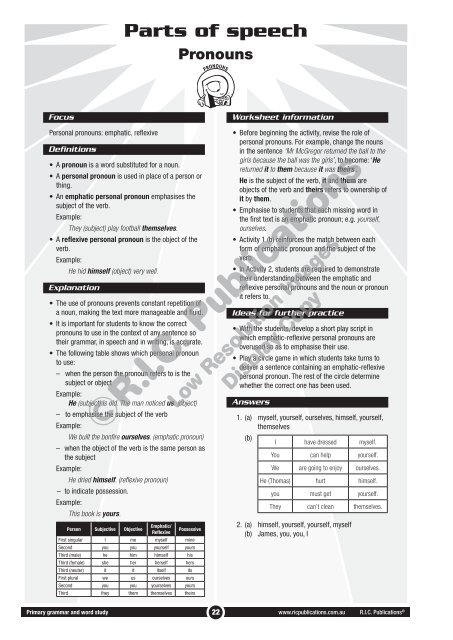RIC-20234 Primary Grammar and Word Study Year 3 – Parts of Speech
Create successful ePaper yourself
Turn your PDF publications into a flip-book with our unique Google optimized e-Paper software.
<strong>Parts</strong> <strong>of</strong> speech<br />
Pronouns<br />
Focus<br />
Worksheet information<br />
Personal pronouns: emphatic, reflexive<br />
Definitions<br />
• A pronoun is a word substituted for a noun.<br />
• A personal pronoun is used in place <strong>of</strong> a person or<br />
thing.<br />
• An emphatic personal pronoun emphasises the<br />
subject <strong>of</strong> the verb.<br />
Example:<br />
They (subject) play football themselves.<br />
• A reflexive personal pronoun is the object <strong>of</strong> the<br />
verb.<br />
Example:<br />
He hid himself (object) very well.<br />
Explanation<br />
• The use <strong>of</strong> pronouns prevents constant repetition <strong>of</strong><br />
a noun, making the text more manageable <strong>and</strong> fluid.<br />
• It is important for students to know the correct<br />
pronouns to use in the context <strong>of</strong> any sentence so<br />
their grammar, in speech <strong>and</strong> in writing, is accurate.<br />
• The following table shows which personal pronoun<br />
to use:<br />
<strong>–</strong> when the person the pronoun refers to is the<br />
subject or object<br />
Example:<br />
He (subject) is old. The man noticed us. (object)<br />
<strong>–</strong> to emphasise the subject <strong>of</strong> the verb<br />
Example:<br />
We built the bonfire ourselves. (emphatic pronoun)<br />
<strong>–</strong> when the object <strong>of</strong> the verb is the same person as<br />
the subject<br />
Example:<br />
He dried himself. (reflexive pronoun)<br />
<strong>–</strong> to indicate possession.<br />
Example:<br />
This book is yours.<br />
Person Subjective Objective<br />
Emphatic/<br />
Reflexive<br />
Possessive<br />
First singular I me myself mine<br />
Second you you yourself yours<br />
Third (male) he him himself his<br />
Third (female) she her herself hers<br />
Third (neuter) it it itself its<br />
First plural we us ourselves ours<br />
Second you you yourselves yours<br />
Third they them themselves theirs<br />
• Before beginning the activity, revise the role <strong>of</strong><br />
personal pronouns. For example, change the nouns<br />
in the sentence ‘Mr McGregor returned the ball to the<br />
girls because the ball was the girls’, to become: ‘He<br />
returned it to them because it was theirs’.<br />
He is the subject <strong>of</strong> the verb, it <strong>and</strong> them are<br />
objects <strong>of</strong> the verb <strong>and</strong> theirs refers to ownership <strong>of</strong><br />
it by them.<br />
• Emphasise to students that each missing word in<br />
the first text is an emphatic pronoun; e.g. yourself,<br />
ourselves.<br />
• Activity 1 (b) reinforces the match between each<br />
form <strong>of</strong> emphatic pronoun <strong>and</strong> the subject <strong>of</strong> the<br />
verb.<br />
• In Activity 2, students are required to demonstrate<br />
their underst<strong>and</strong>ing between the emphatic <strong>and</strong><br />
reflexive personal pronouns <strong>and</strong> the noun or pronoun<br />
it refers to.<br />
Ideas for further practice<br />
• With the students, develop a short play script in<br />
which emphatic-reflexive personal pronouns are<br />
overused so as to emphasise their use.<br />
• Play a circle game in which students take turns to<br />
deliver a sentence containing an emphatic-reflexive<br />
personal pronoun. The rest <strong>of</strong> the circle determine<br />
whether the correct one has been used.<br />
Answers<br />
©R.I.C. Publications<br />
Low Resolution Images<br />
Display Copy<br />
1. (a) myself, yourself, ourselves, himself, yourself,<br />
themselves<br />
(b)<br />
I have dressed myself.<br />
You can help yourself.<br />
We are going to enjoy ourselves.<br />
He (Thomas) hurt himself.<br />
you must get yourself.<br />
They can’t clean themselves.<br />
2. (a) himself, yourself, yourself, myself<br />
(b) James, you, you, I<br />
<strong>Primary</strong> grammar <strong>and</strong> word study 22<br />
www.ricpublications.com.au R.I.C. Publications ®

















